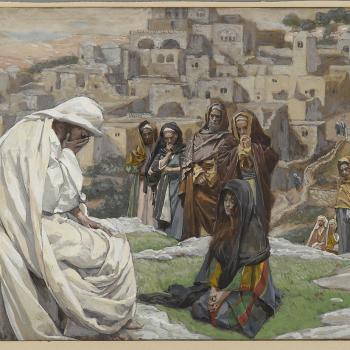
Jesus told a parable in which a widow crosses the boundaries of social acceptability and obtains justice from an unjust judge. That is the story, but that is not where the usual interpretation of the Parable of the Unjust Judge ends up.
This is the tenth in a series of posts on the parables of Jesus, following William Herzog’s interpretive model of Jesus as “pedagogue of the oppressed.” Herzog interprets the Parable of the Unjust Judge, or Persistent Widow, in Part 3, Chapter 12, of Parables as Subversive Speech.
Previous posts in this series:
- William Herzog Reads Jesus’ Parables, Brings them Down to Earth
- Paulo Freire, the “Pedagogue of the Oppressed”: Is This a Good Fit for Jesus?
- Laborers in the Vineyard: A Reading that Doesn’t Blame the Victims
- The Parable of the Wicked Tenants and the Wickeder Landlord
- The Rich Man and Lazarus, or an Oppressor who Won’t be Taught
- The Unmerciful Servant Parable Trashes Messianic Hopes
- The Horrifying – or Tragic – Parable of the Talents
- Publican and Pharisee: A Parable of Two Public Sinners
- The Friend at Midnight – Shameless, but in a Good Way
The pedagogue of the oppressed vs. the traditional Lukan interpretation
A key part of the model, “pedagogue of the oppressed” (see this post), is the way education proceeds. It’s not just handing down skills and knowledge, which the oppressors have and the oppressed don’t. That way leads oppressed people to devalue their own culture and ways of thinking. Education should be a process in which clients learn to discover themselves as “creative agents.” Rather than staying with the worldview of the oppressors, they come to see the world as it is. They discover possibilities beyond what their former restricted view offers.
The test of this model, for Herzog, is whether Jesus’ parables work like that. Or is the Teacher simply serving up ideas for his students to absorb? In our Scriptures Jesus’ parables often come with conclusions or a “moral of the story.” But these are interpretations added by the evangelists or their sources. Once we uncover the parables as Jesus probably told them, they seem a lot like discussion starters.
The Parable of the Unjust Judge is a story Jesus told with a biblical interpretation that probably didn’t come from Jesus. Luke places it together with the Parable of the Pharisee and the Publican. Both, on Luke’s reading, deal with prayer or persistent prayer. An introduction already gives away his idea of the parable’s meaning:
Then Jesus told them a parable about their need to pray always and not to lose heart. (18:1)
At the end in Luke we hear that God will quickly grant justice to those who “cry to him day and night.” If this Lukan and traditional interpretation of the Parable of the Unjust Judge is correct, then there doesn’t seem to be much thinking for themselves for Jesus’ listeners to do. Herzog takes another look at the parable and at the context in which Jesus told it.
The parable of the Unjust Judge as Jesus probably told it (Luke 18:2-5)
According to Herzog, the scholarly consensus around Jesus’ telling of the parable is “impressive.” The introduction I referred to above (verse 1) is Luke’s. Verses 7 and 8 at the end about God granting justice are independent sayings, not part of the parable.
There is disagreement about verse 6: “And the Lord said, ‘Listen to what the unjust judge says.’” Herzog eliminates this also from what Jesus probably said. It doesn’t seem that Jesus would put his main message into the words of such a disreputable character. Without this line the judge’s reluctant giving in to the woman needn’t carry the whole weight of the parable. His concession doesn’t have to be our reassurance that God is more willing than that to answer our prayers.
Without the verses Luke adds, the parable doesn’t have to be about prayer at all, or about how God responds to prayer. We can focus on the story’s most interesting and controversial character, the widow.
Here is the parable as Herzog thinks Jesus probably told it:
In a certain city there was a judge who neither feared God nor had respect for people. In that city there was a widow who kept coming to him and saying,
Grant me Justice against my opponent.
For a while he refused, but later he said to himself,
Though I have no fear of God and no respect for anyone, yet because this widow keeps bothering me, I will grant her justice, so that she may not wear me out by continually coming.
What does the unjust judge want?
Jesus likes to put surprises into his stories, but an unjust judges in the land of Torah, God’s Law, comes as no surprise to Jesus’ listeners. This judge apparently is unusual only in being more open, at least to himself, about his character: “I have no fear of God and no respect for anyone.” The surprise in Jesus’ stories normally comes at the end. In this case the It’s that a woman beats a judge at his own game.
There’s must be a decent amount of money involved in the widow’s suit in front of the judge. One or more interested individuals are claiming a stake in what should be her inheritance. The judge delays a verdict “for a while.” He wouldn’t do that unless there were something in it for himself. He’s angling for the best offer, that is, best bribe, before settling the case for one claimant or another. This involves behind-the-scene negotiations.
The ideal Torah and the real practice of law
In Jewish Scriptures the widow is like a symbol for anyone who is poor or oppressed. The widow, the orphan, the poor, the lame, the slave, and the stranger are special concerns of the prophetic and law books. Israel was not unique in this respect. Other ancient Near Eastern law codes showed similar sensibilities. But it’s fair to say that Jewish Scriptures stood above the rest in the seriousness of their concern. God gives the Israelites a reason for this option for the poor: “You were once strangers and slaves in Egypt.” God won’t even accept Israel’s religious offerings unless the poor receive justice.
Legal practice did not necessarily follow the ideal. The Law codifies the priority according to which cases were to be heard: orphans first followed by widows. But the judge in Jesus’ story is in no hurry to bring the widow’s case forward. The law specified that at least three judges, not one, should hear the widow’s case; but it’s much easier to bribe a single judge. Neither of these infractions, nor the bribery itself, surprises Jesus’ audience.
The woman’s shameless, winning strategy
It’s unusual but not impossible for a woman to go to court. The fact that this woman does go emphasizes how alone she is. She has no one on her side to represent her. She does not have the means for back-door negotiations. All she has is her voice, which she uses day after day in the most disruptive manner possible. She creates a scene. She’s an embarrassment and an inconvenience to the judge, whose goal requires avoiding public scrutiny.
A man acting like this woman would be hustled away violently, but violence against a woman in public would be unseemly. Her weakness is her strength, and she uses it to her advantage.
The judge makes the woman wait as he negotiates with one suitor, then another and another, to get the best bribe he can. He wasn’t counting on the woman’s bold, shameless behavior. Further delay could only mean further embarrassment and even public backlash. So he decides for the woman, hoping that next time bribes will come more swiftly.
A lesson or something else
It’s possible to make Jesus’ parable a lesson about prayer, as Luke does. The unjust judge finally grants the woman’s petition. Even more will God answer the prayers of those who call upon him. The parable works as an encouragement to pray – not a bad lesson.
But for that lesson the parable doesn’t work very well. The woman succeeds because of the rightness of her cause and by her ability to embarrass the judge. But what rights can we claim with God, or what power do we have over God? Jesus could have made the point with a much simpler tale – say, about a parent giving candy to a child who asks for it. That parable wouldn’t have distracted us with financial intricacies, judicial shenanigans, or a brave woman who wins her just cause.
Jesus didn’t put all those things into his story just for spice value. Each one of them makes the story what it is, and the woman is the most important of all. God is not a character or the referent of any character, though God’s history of opting for the poor is there in the background. That is part of the point of this parable.
As a lesson, the parable aims somewhat short of “Go and do like the oppressed widow.” Her situation is not likely to come around in the real lives of Jesus’ listeners. But the oppression she experiences and the weakness of her situation are reality. Against the odds she succeeds. There’s hope in that. The powers that be, aligned as they are against Palestine’s poor, are not all-powerful. Jesus’ story encourages God’s favored ones to imagine a new reality and find ways to create their own space on the journey to that kingdom.











